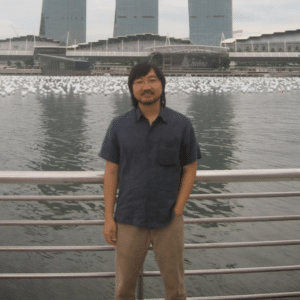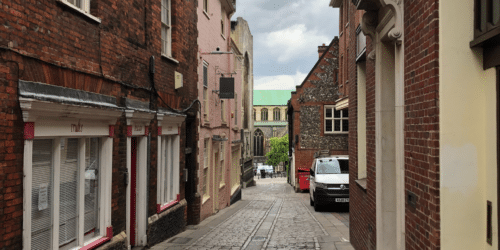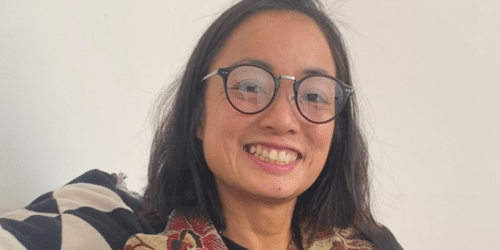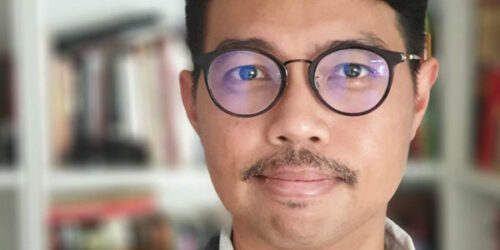
During his virtual residency with NCW, Sim Wai-chew is translating the short story collection A Track in the Wilderness (野径) by Singaporean writer Hai Fan. The ecological consciousness that pervades his work stems from his 13-year participation in the Second Malayan Emergency. In this contribution to Walking Norwich, Sim Wai-chew imagines an unexpected connection between a participant of that struggle and the city of Norwich.
The Road Taken, by K. Neo
(Translated from the Chinese by Wai-chew Sim)
We had just arrived at Norwich airport and enjoyed the short taxi trip to my friend’s semi-detached home located near the University of East Anglia.
This was our first time in England but actually our second trip to Europe. A few years ago, my elder brother insisted that we visit Volgograd to see the war monuments. My brother was injured during the Emergency when we fought with the side that lost, so, out of guilt, I tend to listen to him.
Anyway, my friend, Steve D____, asked if we needed a ride in from the airport. I said it was close to his place. We should just take a taxi.
Steve is around my age ––67 young–– and quite sprightly. His wife passed on a few years ago. His eldest stays in Great Yarmouth and comes to visit him once or twice a month. He gets busy with all kinds of charity work and “side” projects. I think he has an allotment as well where he grows salad potatoes. Before I came, he told me in an email that he had a new “squeeze”––I had to look up that word. When Min and I come to visit we should all go hiking in the Broads. This part of the country is super flat and is totally unlike the hills in you know where, he said, referring to the Thai-Malaysian border.
I said that was a wonderful idea.
Steve’s paternal grandfather used to own a rubber plantation in Malaysia. As an offspring of a planter, he was in the atas class, he was a real-life class enemy.
I was with the second regiment then and we were stationed in the Bukit Pawang area near the Thai border. Around that time there was an internal schism in the party, and for some reason we started to fight the first regiment. They crossed into our territory and laid mines, and we did the same in their area, with tragic consequences as it turned out. To this day, I still don’t know why it happened.
Anyway, one day I was tasked to get some of the rattan vines that we use for cordage.
I was in a ravine near one of our observation posts, keeping my eyes peeled for rattan palm––the leaves are twice-pinnated and are encased by thorns––when I heard a shuffling sound coming from behind a large Ashoka tree. It sounded man-made, not something you associate with a wild boar, so I crept closer to take a look. It was probably a hillside farmer, I thought. Occasionally they come into the jungle to harvest vines. Or it could also be one of the indigenous tribesmen that we call Orang Asli.
When I saw Steve, my jaw dropped. I raised the carbine rifle in my hand and pointed it at his midriff. He immediately put up his hands.
“I’m gathering honey,” he said in Malay.
He didn’t look like a soldier. He did dress like a planter with a purple-striped cravat tucked into the neck of a dress shirt, and long cotton pants. For a tropical country, the outfit was unusual and perhaps slightly outlandish.
“I got lost,” he added ruefully.
I was caught on the horns of a dilemma. If I let him go, he might report us. We were actually scheduled to shift to another site the next day––hence the need for cordage––but even so it seemed foolish to take the risk.
I kept my rifle trained on Steve but I kept thinking about the incident the previous night when we heard the mine going off in the territory of the first regiment. For over two hours we heard a low muffled groaning, and some words that we couldn’t make out. It ended just before dawn.
Finally, I relented. I pointed my muzzle a little to the right of Steve, gesturing at a landmark in the distance. Then I gave him instructions on how to get back to Petai river.
“If you report this, we will hunt you down and kill you.”
After that I forgot about the incident. Our fortunes ebbed and flowed but steadily got worse. Then somehow after the Hatyai agreement was signed, and after my brother and I had returned to Singapore and I had already carved out a new life as a language teacher, Steve managed to get my phone number and one day, just like that, he called me. He said he was curious about the man who had spared his life.
“There aren’t many of you old-timers left,” he said.
Anyway, that’s how we met. And how we formed a connection. He has visited me a few times in Singapore and this is the first time that I’m visiting him. Remarkably, it seems to me, I find myself at his brown brick home located near a university with striking ziggurat-shaped student accommodation. I’ve been here two days now and I’m finally getting over the jet lag.
Tomorrow, we will visit the cemetery where Steve’s wife, Bridget, is buried. His girlfriend, Gertrude, seems fine with the idea. Before we left, he went onto the internet and printed out a description of the routes that we could take, including the vegetation that we could expect. Red oak, weeping beech, Persian ironwood––I was entranced by the names.
As we drove through the UEA campus before heading out to the cemetery, I noticed a road sign.
“We also have a Norfolk Road in Singapore. There’s a restaurant there where you can get the best gado-gado in Southeast Asia,” I said.
“Best in Southeast Asia, huh?” Steve said, turning the wheel of his ancient Range Rover.
“The next time I come to visit, you’ll have to bring me there,” he said.
“That would be something else,” he added.

 Wai-chew Sim obtained his BA (Honours) from the University of East Anglia and his PhD from the University of Warwick. His work has appeared in Textual Practice, The Journal of Commonwealth Literature, and CLCWeb: Comparative Literature and Culture. His English translation of Singapore writer Joo-Ming Chia’s sinophone novel, Exile or Pursuit [放逐与追逐] was published by Balestier Press in 2019. Website
Wai-chew Sim obtained his BA (Honours) from the University of East Anglia and his PhD from the University of Warwick. His work has appeared in Textual Practice, The Journal of Commonwealth Literature, and CLCWeb: Comparative Literature and Culture. His English translation of Singapore writer Joo-Ming Chia’s sinophone novel, Exile or Pursuit [放逐与追逐] was published by Balestier Press in 2019. Website
This residency is generously supported by the National Arts Council of Singapore.
You may also like...
‘In Search of Solace’ by Paige Aniyah Morris
‘My immediate must-do upon arriving in Norwich would have to be tracking down at least one pocket of the city where the noise dulled, where I could be alone.’

18th September 2023
‘Running (Haphazardly Around) Norwich’ by Meihan Boey
NCW resident and author Meihan Boey describes her time staying in Norwich, providing a warm, humorous take on a run that has a story all its own to tell.

3rd August 2023
5 tips for translating culture
Essential advice from translator Nazry Bahrawi

30th September 2021






